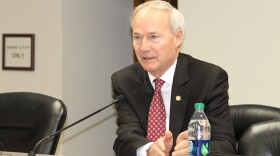The number of Arkansans removed from the state Medicaid rolls has increased by 51 in the past week, but the number reinstated has increased by 2,734.
That’s according to figures supplied Monday by Amy Webb, Department of Human Services spokesperson, following a meeting of the House and Senate Public Health, Welfare and Labor Committees.
DHS is determining income-based eligibility for 600,000 recipients of Medicaid and the private option who have been on the system more than a year. Webb told reporters that 46,373 Arkansans so far have lost coverage as part of the redetermination process.
Coverage originally ended for 60,399, but 14,026 were reinstated either through an appeals process or because DHS was found to be at fault.
Of the 60,399 cancellations, 56,600 have lost coverage because they failed to verify their incomes with DHS. Another 3,799 were found to be no longer eligible. Meanwhile, 74,530 Medicaid and private option recipients have had their coverage renewed, Webb said.
The number of reinstatements has grown significantly faster in the past week than the number of cancellations. On September 29, 60,348 Arkansans had lost coverage, but coverage had been reinstated for 11,292.
DHS was supposed to begin the process in January and complete it by the end of September, but instead had to begin in July because of problems with its computer system, DHS Director John Selig told legislators Monday. So far, it’s started the process on 400,000. Under a new 90-day extension granted by the federal Centers for Medicare and Medicaid Services, it is supposed to begin the process on all 600,000 by Dec. 31.
DHS initially gave Medicaid and private option beneficiaries 10 days to respond to a request to verify their incomes if state workforce data indicated their incomes had changed. That deadline was changed to 30 days on August 28 under guidance from the Centers for Medicare and Medicaid Services. As part of the transition, DHS is not currently sending out new cancellation letters.
Medicaid is the state-administered program that provides health services for the poor, the disabled, and the aged. The private option uses federal Medicaid dollars to purchase private insurance for Arkansans with incomes up to 138% of the federal poverty level. It has been controversial since its creation in 2013 because critics say it is unsustainable and too closely associated with Obamacare. Most of those whose coverage has been cancelled have been private option recipients.
DHS personnel for the first time are determining eligibility for children on the state’s ARKids First program, which was created in the 1990s. Until this year, DHS didn’t verify income but instead accepted statements from family members that the children were eligible.
“This is going to take months. When you’re doing hundreds of thousands of people and you’ve got a system that’s still slow, doesn’t have all the functionality, it’s going to be a while before it works like we want,” Selig told legislators.
It’s been a challenge to determine eligibility for Arkansans who have no Department of Workforce Services data. That means they had no income, but DHS still must verify eligibility. Selig said Gov. Asa Hutchinson has directed DHS to ask the federal government if those recipients can be considered automatically eligible rather than DHS having to contact the client.
Selig said a computer upgrade expected to occur in two weeks will enable DHS to better track newborn eligibility, which wasn’t tracked in the previous system. Because of that flaw, the department fell behind by thousands of newborns but since has reduced that to about one-fourth that amount and hopes to be caught up in a couple of weeks.
Under questioning from Sen. Stephanie Flowers, D-Pine Bluff, Selig said that one of the reasons the state fell behind was because it expected that 80% of renewals could be done automatically, and instead 80% must be done manually.
Asked why the department could not share income information with the Department of Finance and Administration, Selig replied that there are legal restrictions from doing so. Moreover, data from either the Department of Finance and Administration or the Internal Revenue Service would measure last year’s income and would not be up to date.






